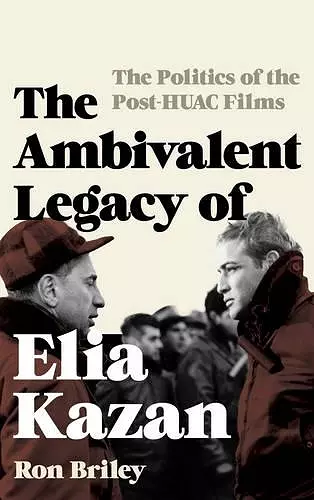The Ambivalent Legacy of Elia Kazan
The Politics of the Post-HUAC Films
Format:Hardback
Publisher:Rowman & Littlefield
Published:28th Oct '16
Currently unavailable, and unfortunately no date known when it will be back

Elia Kazan first made a name for himself on the Broadway stage, directing productions of such classics as The Skin of Our Teeth, Death of Salesman, and A Streetcar Named Desire. His venture to Hollywood was no less successful. He won an Oscar for only his second film, Gentleman’s Agreement, and his screen version of Streetcar has been hailed as one of the great film adaptations of a staged work. But in 1952, Kazan’s stature was compromised when he was called to testify before the House Un-American Activities Committee (HUAC). Kazan’s decision to name names allowed him to continue his filmmaking career, but at what price to him and the Hollywood community? In The Ambivalent Legacy of Elia Kazan: The Politics of the Post HUAC Films, Ron Briley looks at the work of this unquestionable master of cinema whose testimony against former friends and associates influenced his body of work. By closely examining the films Kazan helmed between 1953 and 1976, Briley suggests that the director’s work during this period reflected his ongoing leftist and progressive political orientation. The films scrutinized in this book include Viva Zapata!, East of Eden, A Face in the Crowd, Splendor in the Grass, America America, The Last Tycoon, and most notably, On the Waterfront, which many critics interpret as an effort to justify his HUAC testimony. In 1999, Kazan was awarded an honorary Oscar that caused considerable division within the Hollywood community, highlighting the lingering effects of the director’s testimony. The blacklist had a lasting impact on those who were named and those who did the naming, and the controversy of the HUAC hearings still resonates today. The Ambivalent Legacy of Elia Kazan will be of interest to historians of postwar America, cinema scholars, and movie fans who want to revisit some of the director’s most significant films in a new light.
The Ambivalent Legacy of Elia Kazan is a thorough study of motion picture director Elia Kazan (1909–2003), who publicly named names of fellow communists in the film industry in the early 1950s. Directors and writers who opposed the House Unamerican Activities Committee (HUAC) were punished with temporary or permanent loss of employment, but Kazan, a talented film director, remained active in the Hollywood community. Before ‘naming names,’ he directed such successful films as Gentlemen’s Agreement (1947), A Streetcar Named Desire (1951), and Viva Zapata! (1952). After cooperating with HUAC, he continued to achieve success, despite opposition to his HUAC political position by some fellow directors and professionals, with such films as On the Waterfront (1954) and East of Eden (1955). His final film, The Last Tycoon, was released in 1976, bringing his lifetime total to 21 films. As Briley reveals, throughout his life Kazan made films with antiauthoritarian political perspectives, but in the years subsequent to the HUAC hearings, he never again achieved the high point he reached in the early and mid-1950s. This carefully researched book includes 16 pages of notes. Summing Up: Recommended. Lower-division undergraduates through faculty; general readers. * CHOICE *
If the name Elia Kazan rings only a vague bell, try these movie titles: A Streetcar Named Desire, On the Waterfront, Viva Zapata! Kazan was an acclaimed film director who, during his appearance before the House Committee on Un-American Activities (HUAC) in the early 1950s, named several people as being Communists. Kazan lost many friends, but, unlike others (both those who named and refused to name Communists), he did not lose his career. In fact, he did some of his best work and won the second of his two directing Oscars after his HUAC testimony. This insightful and smoothly written book assays Kazan’s post-HUAC films, arguing that they reflect the director’s personal and political stance. For example: Viva Zapata!, the story of the Mexican revolutionary, can be seen as a deeply anti-Communist movie, and On the Waterfront, of course, is the story of an informer who overcomes his distaste for informing out of a desire to do the right thing. A sharply reasoned look at the career of one of Hollywood’s most important directors. * Booklist *
Academy Award–winning director Elia Kazan (1909-2003) is most famous for two things: testifying against his colleagues before the notorious House Committee on Un-American Activities (HUAC) during the 1950s Hollywood blacklist era, and making 1954's On the Waterfront as a veiled justification for his testimony. Focusing on Kazan's post-HUAC career, Briley portrays the filmmaker, disillusioned by the secrecy and moral certainty of both the Communist Party and the Catholic church, as torn between an obligation to his friends and a fierce individualism. This bears out in his later films, such as the populist biopic Viva Zapata!, the anticommunist Man on a Tightrope, and the semiautobiographical On the Waterfront, which won eight Academy Awards. VERDICT Briley goes deep into Kazan's filmography and politics.... For the dedicated, it's a solid, in-depth portrait of a controversial cinematic icon. * Library Journal *
The Ambivalent Legacy of Elia Kazan is a valuable introduction to an important film and theater director whose HUAC testimony is still a source of controversy, and this fascinating book will have much appeal to readers, especially those interested in film history, politics, and American history. * Journal of American Culture *
ISBN: 9781442271678
Dimensions: 235mm x 160mm x 25mm
Weight: 540g
276 pages